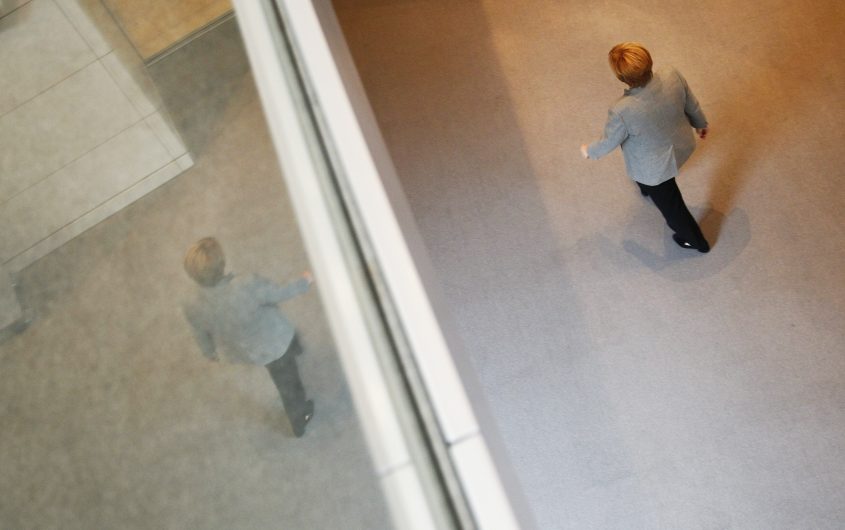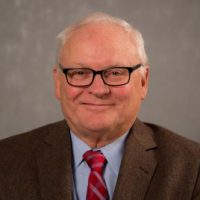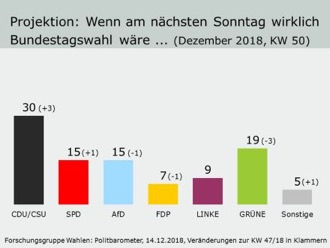
Michele Tantussi/Getty Images
What We Learned about German Politics In 2018 and What It Means for 2019

Stephen F. Szabo
Senior Fellow
Dr. Stephen F. Szabo is a Senior Fellow at AICGS, where he focuses on German foreign and security policies and the new German role in Europe and beyond. Until 2017, he was the Executive Director of the Transatlantic Academy, a Washington, DC, based forum for research and dialogue between scholars, policy experts, and authors from both sides of the Atlantic. Prior to joining the German Marshall Fund in 2007, Dr. Szabo was Interim Dean and Associate Dean for Academic Affairs and taught European Studies at The Paul H. Nitze School of Advanced International Studies, Johns Hopkins University. He served as Professor of National Security Affairs at the National War College, National Defense University (1982-1990). He received his PhD in Political Science from Georgetown University and has been a fellow with the Alexander von Humboldt Stiftung, the Woodrow Wilson International Center for Scholars, and the American Academy in Berlin, as well as serving as Research Director at AICGS. In addition to SAIS, he has taught at the Hertie School of Governance, Georgetown University, George Washington University, and the University of Virginia. He has published widely on European and German politics and foreign policies, including. The Successor Generation: International Perspectives of Postwar Europeans, The Diplomacy of German Unification, Parting Ways: The Crisis in the German-American Relationship, and Germany, Russia and the Rise of Geo-Economics.
2018 was a chaotic and transforming year in German politics. It marked the beginning of the end of the Merkel era’s thirteen-year run. The graphic below, published in the Politbarometer of the Forschungsgruppe Wahlen, shows the state of public opinion at the end of 2018 with the changes from the previous month in parentheses:

Here are some takeaways and implications for the year to come.
Germany Now Has a Six-Party System
The rise of the Alternative for Germany (AfD) has created a more unstable and less governable party system with, for the first time, a significant far-right nationalist party present both in the Bundestag and in all but two of the regional parliaments. The decline of the two Volksparteien has collapsed the center of the political spectrum and pulled both the Christian Democrats (CDU) and the Social Democrats (SPD) to the right and the left, respectively. For at least the next eight to twelve years, the national governing coalition will require three parties—four if the Christian Social Union (CSU) is considered as a separate party from the CDU. This despite poll results from the end of 2018 showing that 76 percent of Germans polled believed that 2018 was a good year for them personally and only 4 percent believed that 2019 would be worse. This seems to indicate that Germany’s discontents are not only economically based. In addition, the rise of the AfD and support for Die Linke in eastern Germany are strong indicators that Germany still has a major regional problem in the east twenty-nine years after unification. The states of the former German Democratic Republic gave these parties around 40 percent of the vote in the last federal election compared to only 18 percent in western Germany.
This could change if the Free Democrats (FDP), Linke, or AfD falls below the 5 percent hurdle needed to enter the Bundestag. Of the three, the FDP has the most precarious position (it did not enter the Bundestag in the previous term). It is represented in 10 state legislatures, all in western Germany, and only participates in 3 of the 16 state governments. Its leader, Christian Lindner, ranks low with the public among political figures. The AfD, in contrast, is in 14 of the 16 state legislatures, although not in any state cabinet.
The Fall of the Social Democrats
The Social Democrats (SPD) are in free fall and are facing an existential crisis with the real prospect of becoming a minority party that will not produce a chancellor, at least for the medium term. They began 2018 at 20 percent in the Politbarometer polls and ended at 15 percent. At the same time, the Greens rose from 12 percent in January to 19 percent in December. This is a stunning development for the oldest social democratic party in Europe and one that has produced three chancellors since the founding of the Federal Republic. While the collapse of the social democratic left has been occurring throughout most of Europe, the SPD has been Europe’s most important party on the left. This will no longer be the case. While the party still holds the minister-president position in six of the sixteen Länder, none are in the powerhouse states like North Rhein-Westphalia, Bavaria, Baden-Württemberg, or Hesse, which are all run by Christian Democrats. The party is aging and has no convincing leaders currently or on the horizon. Party chair Andrea Nahles is ranked low by the public, although both finance minister Olaf Scholz and foreign minister Heiko Maas have more positive public evaluations in the most recent Politbarometer poll. The party is likely to move to the left with the goal of absorbing votes from Die Linke and possibly from the Greens in the hope of consolidating the left.
The CDU Era Will Continue
While the focus of the past year has been on the leadership struggle within the CDU and its sister party, the CSU, the Christian Democrats have emerged as the party that will remain the largest over the next decade and will produce every chancellor during that period. The CDU/CSU began 2018 at 33 percent in the Politbarometer poll and ended at 30 percent. The party was energized by the process of selecting a new party leader and the prospect of a new chancellor candidate in the future. As the poll above indicates, it picked up 3 points in one month following its election of a new party leader. It also stands a chance of slowing or reversing the growth of the AfD on the right, although it does not appear that it can push the AfD below the 5 percent hurdle. It could, however, absorb enough of the FDP vote to push the Liberals below the 5 percent hurdle once again. The relationship with the Bavarian CSU remains fraught with problems and the incentive will be to move to the right.
Merkel’s Successor Is Still Not Certain
Although 2018 was a terrible year for Angela Merkel, her poll results are still in positive territory. She entered 2018 with a +1.5 rating (on a scale of 1 to 5 with 5 being the highest mark) in the most recent Politbarometer poll and was the third most popular political figure. She ended the year at +1.1 and remains the third most popular figure behind only Wolfgang Schäuble and Robert Habeck of the Greens. She is no Trump, Macron, or May. Her continuing popularity helped elect her preferred successor, Annegret Kramp-Karrenbauer (AKK), as the Chairperson of the CDU. However, AKK is not yet its Kanzlerkandidat. The party congress elected her to avoid a collapse of the governing coalition and an early election, but the race to succeed Merkel as chancellor is still open. In addition to Fredrich Merz and Jens Spahn, Minister-President of North Rhine Westphalia Armin Laschet and others will be in the mix. AKK faces a string of elections in three eastern German states (Brandenburg, Saxony, and Thuringia) in the coming year that do not look promising for the CDU, in addition to the European Parliament election in May.
The German constitution requires a positive vote of confidence in replacing a chancellor, which means that Merkel not only has to lose a vote of confidence, but also must be replaced by someone gaining an absolute majority in the Bundestag. This means that it is unlikely that the CDU will be able to replace Merkel without a new election (unless a Jamaica coalition can be revived) as the SPD will not want to give her successor time to build an image as chancellor prior to the election scheduled for 2021. The SPD will need to go to the electorate sometime before 2021 in order to break free of its role as a perpetual junior partner to Merkel and to reestablish its left identity. Although Merkel has handled the leadership succession more deftly than Helmut Kohl, she is a lame duck and is losing power by the day. It is unlikely that she will be able to maintain her authority for more than a year at the most.
Germany Will Have a Divided Government and Will Not Take a Strong Leading Role at Home or Internationally
While the CSU’s Manfred Weber is likely to be the new President of the European Commission, Germany’s role in the EU is likely to remain one of cautious risk avoidance with little sense of a larger public good beyond its borders. The European parliamentary election is likely to produce gains for the populist right and Germany is now facing strong right-wing governments in Hungary, Poland, Italy, and Austria and a weakened president in France. Even a strong German government would be short on partners outside of some northern European states, and this will not be a strong government in Berlin. Given the turmoil in Washington, Berlin will not be able to count on the U.S. for much help either. Germany is now a multilateral power without many partners. Heiko Maas has been surprisingly strong as foreign minister, but his remit is limited both by the chancellor’s office and by the prospect that he will be gone along with his party after the next election, as will finance minister Olaf Scholz.
On the more positive side, the pressing issue of immigration and refugees has been contained with a substantial drop in the numbers coming into Germany. This may help limit the appeal of the AfD, which still has no credible leaders. However, the three state elections in the east are likely to reinforce its support.
All in all, 2019 looks to be a transitional year in German politics with low expectations for leadership in Berlin.









